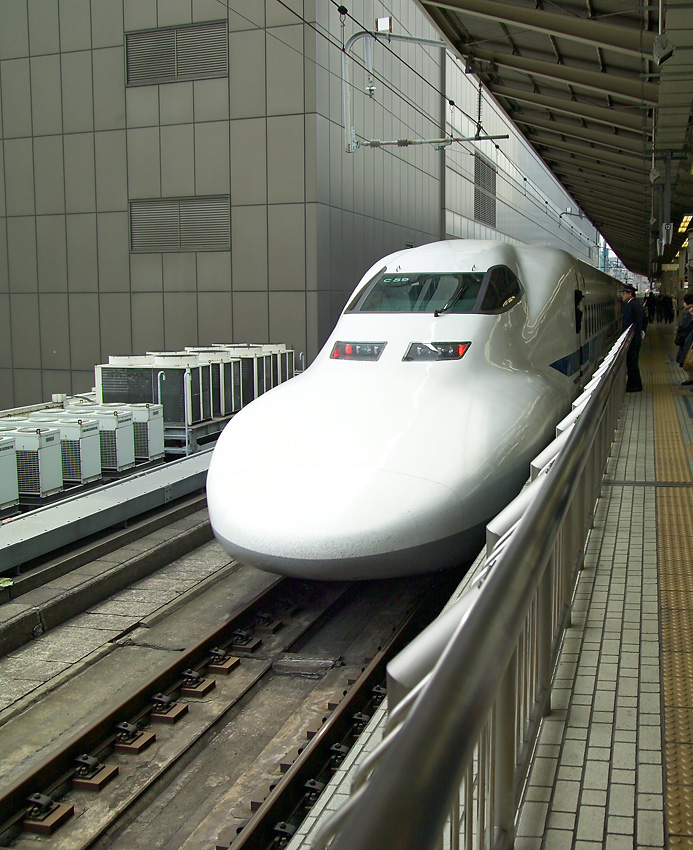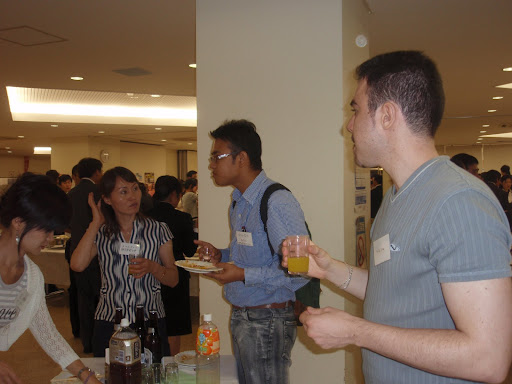Yeah, yeah, nothing written for 2 weeks, I know.
Just that you remember: I'm here for studying and not on vacation and that's exactly what I've been doing meanwhile. So leave me alone already, please.
Well, actualle that's the point today: Universitysystem in Japan.
Japan is pretty much following the American system of Bachelor, Master and PhD courses, which has been adopted in Austria a few years ago. Here, this means 4 years of Bachelorcourses and if you want to graduate with the higher 2. grad another 2 years of Mastercourses. After that, there's the possibility to do research for a couple of years and to write your dissertation to claim the Doctor-degree (PhD), the last part is more or less like the old system in Austria. Since the Bachelor is not only a University-degree but is also handled as such, most students end their studies with it. Unlike back at home, where the old-established Magister (edit: Master) make fun of a Bachelor and don't reckon him as a fully-fledged academic.
(It will be a rude awackening for them)
Hence, in the bachelor-courses you're called an "undergraduate student" (non graduated student) and in the master-courses you are a graduate student (a student who already holds an academic titel). To clarify it once more: The Master is a continuation of a Bachelor and as such simply a higher graduation (cp: Magister <> Doktor).
Now before the grouching starts about how boring all of this is cause it's common knowledge: I have many friends, who are not studying.
(edit: It must also be boring for anglo-americans, they know the system, but because it's just a few years in effect in Austria most people don't know anything about it. sorry)
At this point, what purpose does it really serve? I have something like a special status at the University here. On one hand I'm an exchange student and as such registered at the Cross-Cultural Faculty (国際文化学部), on the other hand I'm also taking Mastercourses at the BA faculty for my study in Graz. As such I'm treated as a Graduate there.
The nice thing concerning this: As Graduate you enjoy (even as foreigner) quite a prestige and even certain privileges. Just for an instance: At the University libraries you are allowed to loan out more books at the same time and moreso you get to keep them twice, here an there even trice as long. Even the professors treat one completely different, the treat you as an academic (in accordance to your title). Especially the undergraduate students show their respect before the Graduates (of course due to the nature of Japanese society). Particularly because you are some kind of "adult" student, a status most of them will never have, due to the fact that the stop after 4 years. Even later in companies people with a Master's degree can climb the ladder faster.
Oh yes, in Japan it's great to be a graduate Student, we should introduce those privileges and the appreciation for them at home too.
Now onto something completely different.
Since I got my registration card last week, I am henceforth officially a legal, registrated alien. And yes, they really call it like that: I own the "Alien Registration Card" and in curatorial documents something's always stated like "as a registered Alien you can ...". Nice to know as what the Japanese actually regard one.
How is it put so aptly?: "I'm an Alien, I'm a legal Alien. I'm an Austrianman in Kôbe" (Sting: Englishman in NY)
Two photos of the card (the colourful hologramms are hard to catch with the camera)
Interesting (and funny) facts/opinions about Japan:
Most readers have an idea what Japanese main streets look like, thanks to corresponding documentations and pictures of Japan on TV. However, many would be surprised by the appearance of the side streets (except for those, who regularly watch Animes or read Mangas). As you can see on the following photos, the side streets are "crammed" with power poles and the corresponding current-carrying cables. Nearly every building is supplied via its own cable from a power pole (not via building-to-building cable) and the greater part of the net runs aboveground. Unfortunately I do not know why it is handled in this manner and sadly up to now I didn't had the time to ask someone about it, however I will do it at some later point and supplement the answer.
My assumption is the following: During an earthquake the danger of a cable"breakage" under the earth is probably bigger compared to freely suspended ones, which can better counterbalance tremors trough natural oscillation. Should a breakage occur, aslong as the pole still stand, only on house is affected and not a whole street of houses at a single blow.
Should someone have an accurate knowledge about what this is all about (Helmut?), or have a better idea I ask for notification, I will correct it accordingly.
After all I want to prevent that false reports or utter nonsense find their way into the "facts/opinions about Japan" column.
(I am not an author for certain "quality newspapers" or a certain public broadcasting station).
(Edit: A friend sinced then talked to a high tension (high voltage) expert, who thinks that primarily it's a question of cost but also says, that the earthquake theory is plausible too.)
So, this slightly longer entry should satisfy you for some time. In conclusion something I found (and bought) at the local department store.
(edit: It's a well-known cleaner brand in Germany and Austria, and it's completely, including the instructions, in German)




